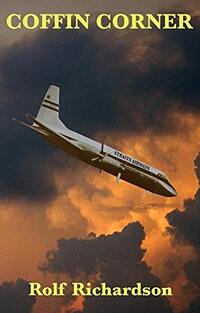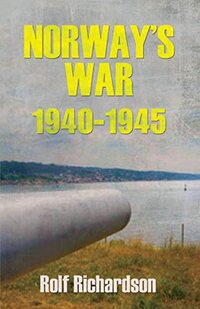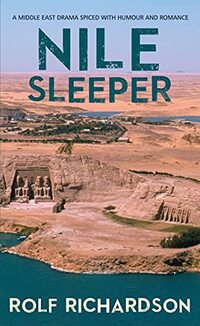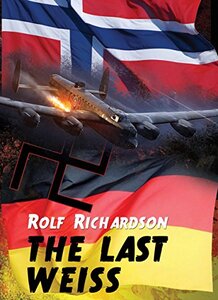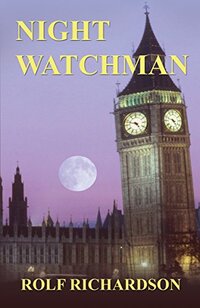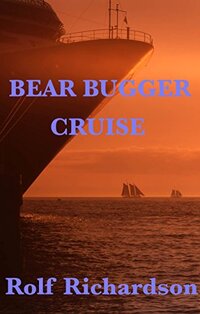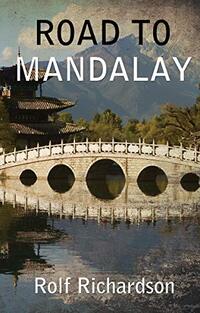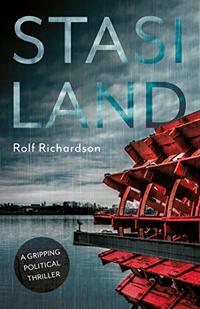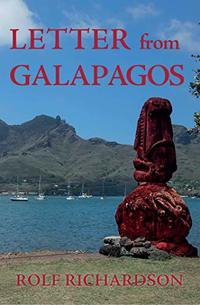Rolf Richardson Interview Published on: 08, Jan 2021
 Where did you grow up? What was your childhood like?
Where did you grow up? What was your childhood like?
My father was English, my mother Norwegian, so I grew up mainly in England, but with many visits to Norway. My childhood was dominated by the war. With hindsight, I can’t think of a better time to be born, because things started tough but got progressively better, leading to the golden era of travel, which I was lucky enough to enjoy to the full. By contrast, my parents were the generation of the damned, my father catching the final 12 months of WW1, which he was lucky to survive, thereafter the depression of the 1930s, then WW2, followed by years of rationing and austerity – a life wrecked by factors outside their control. I was too young to remember pre- war, but know that my mother would take my sister and self to Norway for the summer holidays. We were there in 1939, when war was declared, so my father, back in unform in England, decided it would be safer to leave us there. Norway had been neutral in WW1 and would surely be the same in WW2. It didn’t work out like that, but my father got wind of Hitler’s invasion plans for Norway and got us back to England in the nick of time (how he did this is a story in itself!). We spent the rest of the war in the south of England, occasionally bombed by the Germans, when they couldn’t find London, later as a parking lot for the D-day invasion force.
When not in school, children were left entirely to their own devices, no electronic amusements of course, just the ‘wireless’ (radio). A bonus was that we grew up strictly rationed to probably the best diet known to man: the bare minimum to keep you healthy – obesity was unknown.
While growing up did you, in any way, have any embarrassing moments?Embarrassing moments while growing up? Yes, quite probably, but so long ago I can’t remember. I don’t dwell on things.
How did your friends and family react to your first book?Friends and family reaction to first book? Interest. Support. Many have read it. Probably thinking: ‘Well, it keeps the old boy happy’.
What inspired you to start writing thrillers about the places, politics and people you have met along the way?Inspiration for writing thrillers? Now it gets complicated. Are you ready? Most of us have to earn a living and, unless you are very lucky, writing does not do that, at least not in those early years. I’ve always had itchy feet and the prospect of spending my time composing masterpieces no one wanted to read was not appealing. My problem was solved by something called National Service (the draft to you); it was early 1950s, the Korean war in full swing, cold war at its height, every country needing new cannon fodder for a possible WW3. The most interesting way of spending those two years was to learn to fly, so I applied for the air force and did just that, including Britain’s first jet fighter, the Meteor, great fun but with a horrendous accident record (true of most front line fighters then).
Then the civil aviation market opened up. I had the necessary hours, so three months to get my commercial ticket and I joined BOAC, Britain’s longhaul version of Panam. This was the era before mass travel, so we were able to see many of the world’s great sites with no crowds. I spent 25 years with BOAC, later merged to form British Airways, ending as a 747 captain. A reorganization came along, a slimline version with staff cuts, so I took their handshake and left. By this time the kids were off our hands, the house paid for and I had a good pension; time to do my own thing.
See the answer to question 12 for why I did not take to writing at this stage. Instead, I became a self-employed travel photographer, going to places I wanted, rather than where the airline sent me. This led to lecturing on cruise ships (working my passage, free cruise). In 2015, able to draw on 60 years of intensive travel, I finally took to writing. Add history, politics, travel, humor and a dash of romance and you have my ‘Easy reads’: eight of them to date.
Of all the cruise ships you have taken a cruise on, which was your favorite?Favorite cruise ship? Smaller the better. Oscar Wilde said ‘Each man kills the thing he loves’ and the travel industry has done just that, monster cruise ships having wrecked popular destinations like Venice, Dubrovnik and many Caribbean islands (St.Maarten particularly bad). If you can afford them, Silversea and Seabourn operate small ships to off-beat destinations, but I think our prize would go to a tiny boat, name forgotten, only 16 pax, which took us round the Galapagos, one of the world’s most fragile destinations, which mass travel would simply destroy.
Whom did you base your character, Ed Blake upon? Is he inspired from someone in real life?Character of Ed Blake based on anyone? Not consciously, but every author must invest a bit of himself in the main character. I’ve never been divorced or made loads of money, but Ed Blake must share my outlook.
How much did you research about politics and related things while writing the book, Stasiland?Research on ‘Stasiland’? All my books are based on places I’ve been to and usually know well. In this case, one of my most memorable trips was to the old East Germany before the wall came down. Once I’d negotiated the red tape to get in, no one bothered me, no Stasi (me not important enough?), I could go and do what I liked. It was fascinating, a different world on our doorstep. Command of German was essential because no one spoke English, but with a Norwegian mother I’m into the Scandinavian languages from where German is not too much of a stretch. On the subject of research generally, I’m forever ‘googling’, don’t know what I’d do without it. A special mention must go to Google Earth, an astonishing product that covers almost the whole world (missing part of the Faroe Islands), usually good quality, although Tel Aviv was fuzzy. You can get right down to tee-top level, as though you are there.
If there was anything you could say to your younger self, what would you say?Anything to say to my younger self? Yes, should perhaps have been more assertive. I was OK at the difficult decisions, but have never been comfortable with marketing myself.
As a writer producing a work of fiction, do you tend to know the ending when you start, or do you find out as you write?Do I know the ending of my book when I start? The answer is no. I know roughly where I want to go, but the plot details develop as I go along. Likewise the characters.
What would you do if what happened to Ed Blake happened to you?What would I do if what happened to Ed Blake happened to me? The same, I hope!
What is interesting about the Galapagos?What is interesting about the Galapagos? Quite simply, it’s unique. Nowhere else is the wildlife so tame; were it not forbidden, you could stroke a sealion and remove an egg from under a nesting bird.
What are some tips you can share to a newbie photographer?Tips to share with a newbie photographer? Another long answer:
At the end of question 4 I said that when launching out on my own after a career in flying, I chose photography over writing. The reasoning went like this: both writing and photography carry very low prospects of commercial success. I didn’t want to be a wedding photographer or news hound, which left what they call ‘stock photography’ – supplying photo supermarkets that are the backbone of commercial photography. I’d already started doing this while flying – finding myself in some strange places, I’d built up a holding at a couple of these libraries. It was slow and painstaking work, only about 2% of photos on file sell in any year, but with volume this would add up; perhaps a decent living? Assume the same success rate (2% per annum) for writing and what have you got? A book may take a year to complete, whereas a photo is done and dusted in 1/125 th . second. It was no contest: photography won.
Stock photography was a viable way of making a few bucks in days of film, so would have been a possible career for the newbie, as long as he (or she) was prepared for the long haul – revenue comes on stream slowly. Because of this and the fact that one needed special equipment (only medium format accepted) and there were running costs (I was spending about $4,000 a year on film), this was a nice cosy market for just a few of us. Came the millennium and almost overnight film gave way to digital. Most photo libraries, with roomfuls of now useless film, went bust. We photographers recovered our best images from the libraries and scanned them to digital. Bought a first generation digital camera, then later models as technology progressed. Had a ball, because only we knew how the system worked and were prepared to tackle the complexities of emerging digital. The mid noughties were the golden years. Then, around 2008/09, the market fell off a cliff. Everyman could now cope with digital and wanted to join the fun. My photo income has dropped over 80% from that peak in the noughties. As an industry, photography has joined the has-beens. My advice to any newbie is therefore to enjoy it as a hobby, but forget it as a means of much money.
What is the best way to market a travel business?Best way to market a travel business? Not sure I can answer that. For many years I used a travel agent who did tailor-made tours for individuals. When the dust settles on Covid, we may find that the age of cheap mass tourism has gone for good. Who knows?
Is there anything you are currently working on that may intrigue the interest of your readers?My current project? A thriller set in the Middle East, the finale to be the battle of the Shatila refugee camp in Beirut in September 1982. I’ve spent a lot of time in that part of the world and found it fascinating – most difficult thing has been to maintain a balance between the rival factions.
What are your thoughts on AllAuthor? Would you recommend this platform to your other author friends?Thoughts on All Author: Publishing is not unlike photography in the digital age: a vast number of practitioners flooding a limited market. Any site that can help us with the oxygen of publicity is to be welcomed. My heartfelt thanks to All Author.
Share Rolf Richardson's interview
An airline pilot, photographer and cruise lecturer, Rolf Richardson took to writing in 2015 after being able to draw on 60 years of intensive travel. With every well-written novel, Rolf educates and entertains. Rolf shows his worldly knowledge with every thriller he writes.
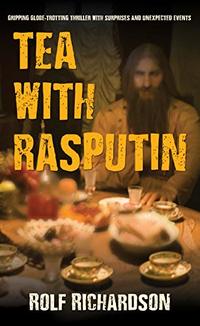 TEA WITH RASPUTIN : GRIPPING GLOBE-TROTTING THRILLER WITH SURPRISES AND UNEXPECTED EVENTS
Genre: Thriller, Mystery, Historical Fiction
TEA WITH RASPUTIN : GRIPPING GLOBE-TROTTING THRILLER WITH SURPRISES AND UNEXPECTED EVENTS
Genre: Thriller, Mystery, Historical Fiction

